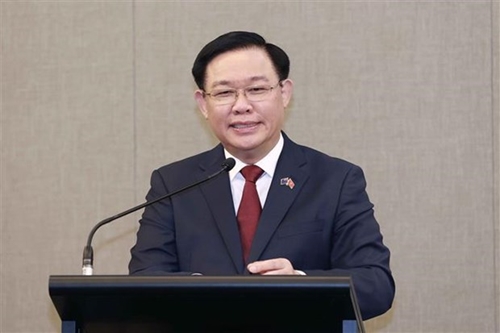Apart from sound relations in politics, diplomacy, defense, security, education and training, and science and technology, partnerships in economy, trade and investment have also been thriving.
The two sides are working towards USD 2 billion in annual bilateral trade, but this target remains modest compared to their economic potential, and investment in each other’s countries is still low.
    |
 |
|
Chairman of the National Assembly (NA) Vuong Dinh Hue speaks at the forum. |
Chairman Vuong Dinh Hue said Vietnam and New Zealand have favorable conditions to increase economic ties as both are members of key new-generation free trade agreements such as the Comprehensive and Progressive Agreement for Trans-Pacific Partnership (CPTPP), the Regional Comprehensive Economic Partnership (RCEP), and the ASEAN-Australia-New Zealand Free Trade Area.
They boast much potential and many advantages for augmenting cooperation amid disrupted global trade and investment due to the COVID-19 pandemic and the unpredictable international situation. In addition, they are also members of four important regional cooperation frameworks, namely the Asia-Pacific Economic Cooperation (APEC), the Association of Southeast Asian Nations (ASEAN), the East Asia Summit (EAS), and the Asia-Europe Meeting (ASEM).
Such intensive and extensive economic connections at both bilateral and regional levels will guarantee maintained supply chains, reduce barriers to international trade, and create a new and greater space for economic cooperation, especially when the two economies do not compete with but are complementary to each other, the N.A. Chairman said.
He cited Governor-General of New Zealand Dame Cindy Kiro as saying at an earlier meeting with him that 14,000 people from the country visited Vietnam in the first 10 months of 2022, contributing to the 24-fold year-on-year increase in the number of foreign arrivals to the Southeast Asian country, and this figure will grow if direct air routes between two countries are maintained.
"Those examples evidence that there remains huge potential for bilateral cooperation," he said, adding that it is necessary to lift trade barriers and create optimal conditions for each other to fuel bilateral economic, trade, and investment links.
The top legislator shared New Zealand businesses’ view that apart from traditional cooperation areas, the two countries can expand collaboration to many other spheres such as startups, innovation, digital transformation, digital economy, digital society, and just energy transition, which are also global issues that Vietnam is focusing on.
The N.A. and Government of Vietnam are striving to remove business barriers to create the best possible investment and business climate, he noted, adding that the country is also proactively preparing other conditions necessary for receiving a new investment wave.
Vietnam views the successes of New Zealand enterprises and other foreign investors as its own, Chairman Vuong Dinh Hue stated.
Addressing the forum, New Zealand Minister for Trade and Export Growth Damien O’ Connor stressed the two countries share many similarities, and Vietnam is a big market for his country.
He held that agricultural relations are bearing fruit as the two sides have opened their markets to some of each other’s fruits. Besides, they also have many experiences to share in such spheres as education, agriculture, technology, culture, and sustainable development to promote their strategic partnership.
Many New Zealand enterprises operating in the fields of intellectual property and manufacturing are also seeking cooperation opportunities in Vietnam, he said.
At the forum, Chairman Vuong Dinh Hue and officials of the two countries witnessed a representative of the Vietnamese Government handing over an agreement on importing New Zealand’s strawberries and pumpkins to Vietnam to a representative of the New Zealand Government.
Source: VNA